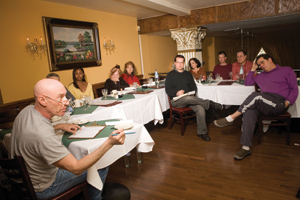|
||
      |
Peer Review ::
Philosophic Legacy
Ken Feldman and unlike-minded souls debate life’s big questions.

Feldman (at center, in dark sweater) moderates an October meeting at
Odéon Café.
In the dark-wainscoted back room of a Washington, DC, bistro, 18 men and women regard each other with civility and disdain. This August Saturday they pass up perfect weather to tackle the question du jour: “Which comes first, the right or the good?”
At the meeting of Café Philo DC, a philosophy-discussion group founded by Ken Feldman, AB’74, arguments ricochet around the room, pitting acquaintances—and occasionally relatives—against one another. Abram Rose addresses moral axioms. “We choose abstract rules based on the consequences for society. ... We can’t fully know all consequences, but we do the best we can with something immediately observable. Consequences in the long and short term are where morality should be grounded.”
Rose’s father Hewitt protests. “We can never calculate all consequences,” he says. “As a lawyer, I must make decisions under uncertainty.” Others bring up current and historical examples: Did a belief that Saddam Hussein had weapons of mass destruction justify the war in Iraq? What about the French villagers of Le Chambon who risked their lives to protect Jewish neighbors during the Nazi occupation? Would a consequentialist point of view support such heroic acts?
The question remains unsolved at the afternoon’s end—but coming to a consensus is beside the point. For the group’s roughly 20 regular attendees and steady handful of newcomers, disagreement is part of the fun.
Feldman, a retired environmental consultant, started the group seven years ago after attending a Café Philo meeting in Paris. Founded in 1992 by the late French philosopher Marc Sautet, the Paris group inspired similar meetings throughout France and eventually worldwide. Feldman thought a discussion group in Washington might get members to question assumptions inherent in their political beliefs. In practice, the exchange of ideas forces participants to clarify their positions but seldom changes minds.
“We are blessed with a number of people in this group who have spent years thinking out their points of view,” says Bonnie Wachtel, AB’77, MBA’78, who moderated a recent terrorism discussion. Wachtel is one of several Chicago graduates who attend, though Café Philo DC is open to anyone. Feldman, who moved to Rhode Island in July, continues to coordinate from a distance, e-mailing readings for upcoming meetings to more than 1,000 people on the group’s discussion list.
The group attracted its largest crowds after September 11, 2001, when about 40 people turned out to talk about responses to terrorism and how the attacks had affected their basic beliefs about security and moral values. “It was like a group-therapy session,” recalls Feldman. “People were still shell-shocked.”
Today Café Philo DC occasionally veers toward policy issues, but theoretical questions such as “Is personal identity a fiction?” and “What is reality?” remain the usual fare. While Café Philo’s effect on national policy debates is limited, for some individuals the discussions have inspired deeper contemplation. As regular participant Alexandrine Derrien says, “You go out with more questions than when you came in.”